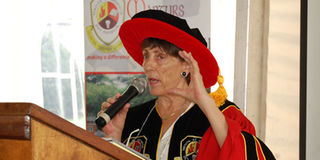Tertiary institutions urged to embrace e-learning

Prof Deirdre Carabine gives a lecture on education matters at Uganda Martyrs University at Nkozi Main Campus on Thursday. PHOTO BY SADAT MBOGO
What you need to know:
- Prof John Chrysostom Maviiri, the Vice Chancellor tasked students to always use University skills to build themselves to be community thinkers, good managers and leaders with value in their respective communities.
Tertiary institutions in the country have been advised to establish e-learning education and training as a way of improving the education standards and transforming the society.
While delivering her keynote speech at the fourth Commencement Lecture at Uganda Martyrs University, Nkozi Main Campus in Mpigi District on Thursday, Prof Deirdre Carabine, a consultant in the Programmes Office at Virtue University Uganda and was once a Registrar and Deputy Vice Chancellor of the former said "digital education" is the way to go if a tertiary institution seeks global competition in providing skills to a student with difference.
"Prepare for the provision of education to professionals who can't afford to leave work to gain another qualification. Technology-supported learning saves time, human power, enable young professionals add to their skills without spending a lot of their wages and the dream can become true with the use of simple laptops or tablets and smart phones," she said.
The Commencement Lecture was under the theme; "Uganda Martyrs University over the years; Achieving the mission of its foundation."
Prof Carabine added that tertiary education learners of the current generation are tired of carrying many research booklets and moving to lecture rooms every day to take notes.
"That they want everything in soft copies. This is a clear signal for you (University authorities) to try e-learning education now. Let our country be creative, innovative and multidimensional to providing quality service delivery to the society," she said.
Prof John Chrysostom Maviiri, the Vice Chancellor tasked students to always use University skills to build themselves to be community thinkers, good managers and leaders with value in their respective communities.
He also urged students and professionals to get knowledge about the history of their country and learn philosophy and ethics to widen wisdom for political, technological and socio-economic transformation.




